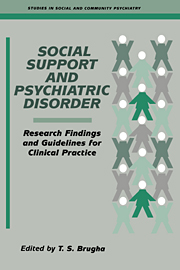Book contents
- Frontmatter
- Contents
- Preface
- List of contributors
- 1 Social support and psychiatric disorder: overview of evidence
- PART I CONCEPTS AND ORIGINS OF SOCIAL SUPPORT
- PART II LESSONS FROM SELECTED OBSERVATIONAL STUDIES
- 6 Social support as a high-risk condition for depression in women
- 7 The importance of context: who needs and who does not need social support among college students?
- 8 Teenage peer networks in the community as sources of social problems: a sociological perspective
- PART III LESSONS FROM INTERVENTION STUDIES
- PART IV INTERVENTION PRINCIPLES AND RECOMMENDATIONS
- Index
6 - Social support as a high-risk condition for depression in women
from PART II - LESSONS FROM SELECTED OBSERVATIONAL STUDIES
Published online by Cambridge University Press: 31 October 2009
- Frontmatter
- Contents
- Preface
- List of contributors
- 1 Social support and psychiatric disorder: overview of evidence
- PART I CONCEPTS AND ORIGINS OF SOCIAL SUPPORT
- PART II LESSONS FROM SELECTED OBSERVATIONAL STUDIES
- 6 Social support as a high-risk condition for depression in women
- 7 The importance of context: who needs and who does not need social support among college students?
- 8 Teenage peer networks in the community as sources of social problems: a sociological perspective
- PART III LESSONS FROM INTERVENTION STUDIES
- PART IV INTERVENTION PRINCIPLES AND RECOMMENDATIONS
- Index
Summary
Introduction
Although the literature on social support and its influence on mental and physical health has grown exponentially over the last two decades, very few studies have compared the effects of support on mental health across basic sociodemographic categories such as defined by gender or marital status. This holds particularly for studies examining clinical samples. Many researchers seem to have implicitly assumed social support to be some kind of cultural constant, with comparable beneficial effect in all segments of the population. However, to expect social support to play the same or even similar roles for men and women, for the old and the young, and for the married and the single does not seem realistic: socialisation experiences, life conditions, and social roles and expectations differ enormously between these groups. The literature on gender-specific socialisation (e.g. Gilligan, 1982) and on the differentiation of support functions (e.g. Belle, 1982) suggests that men and women differ in their need for, and general approach to, social support. Indeed, two recent studies which have examined sociodemographic moderators of support effects on depression (Billings & Moos, 1985; Brugha et al., 1990) have found such gender differences. These differences, however, were rather small and not as fundamental as the literature would lead one to expect.
Keywords
- Type
- Chapter
- Information
- Social Support and Psychiatric DisorderResearch Findings and Guidelines for Clinical Practice, pp. 145 - 162Publisher: Cambridge University PressPrint publication year: 1995
- 2
- Cited by



